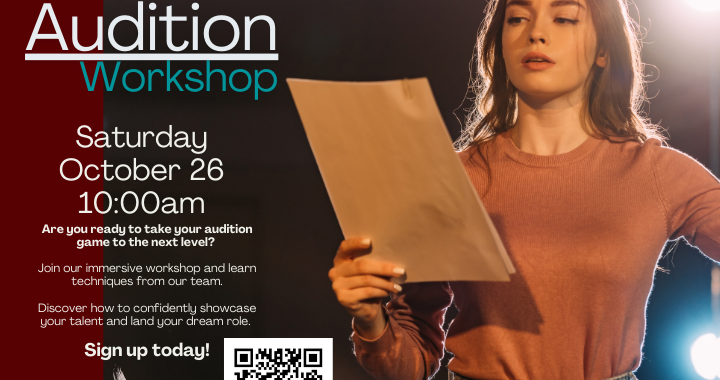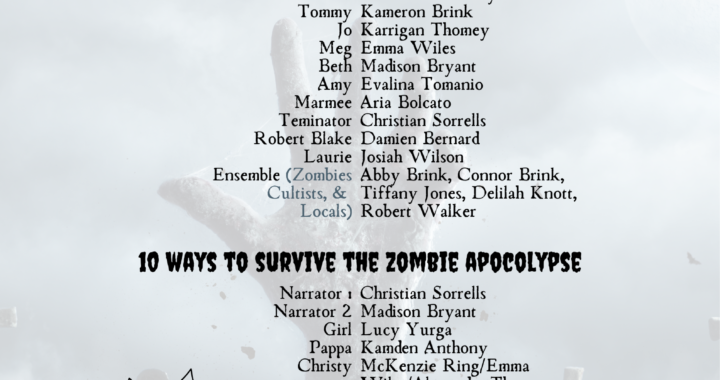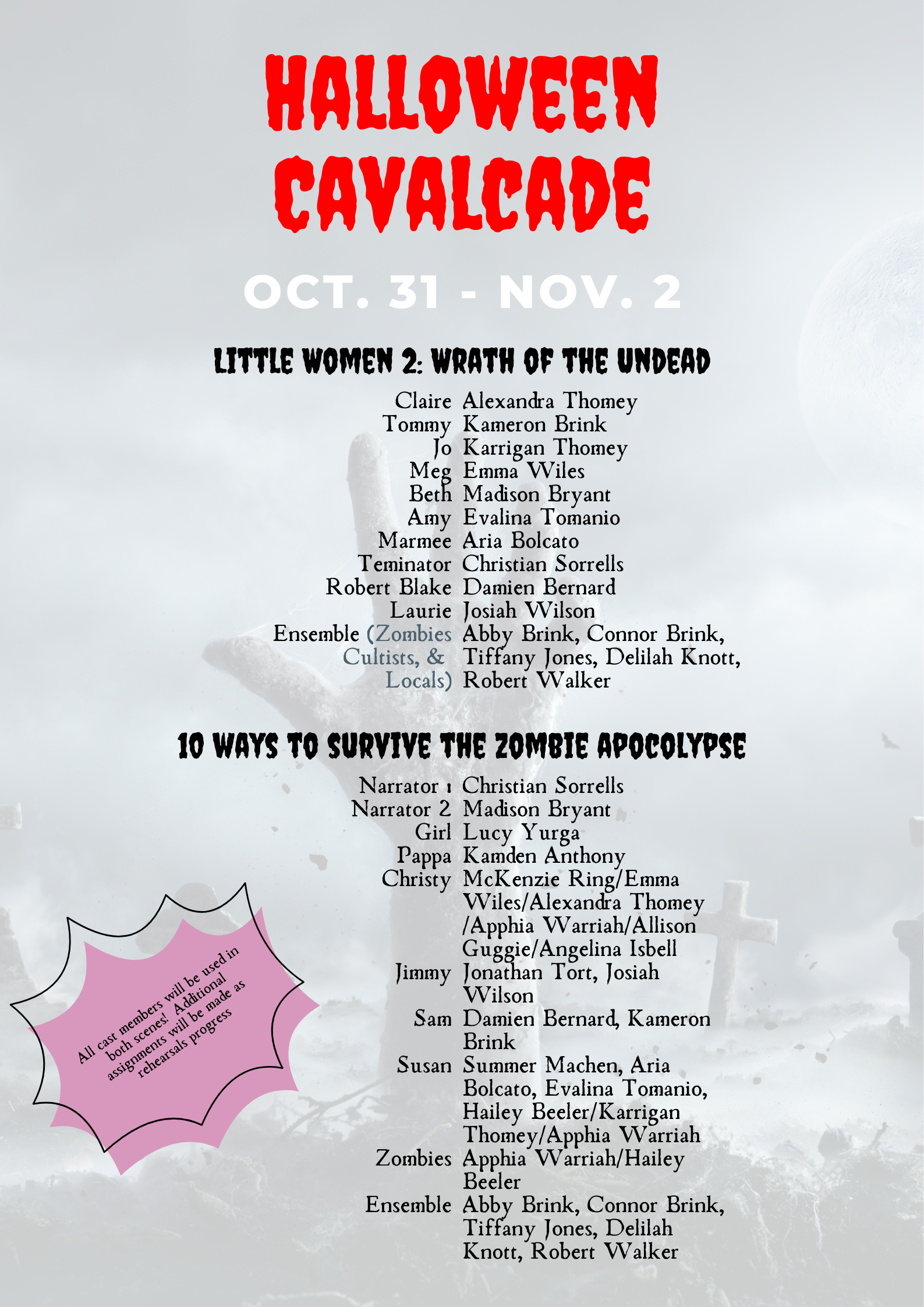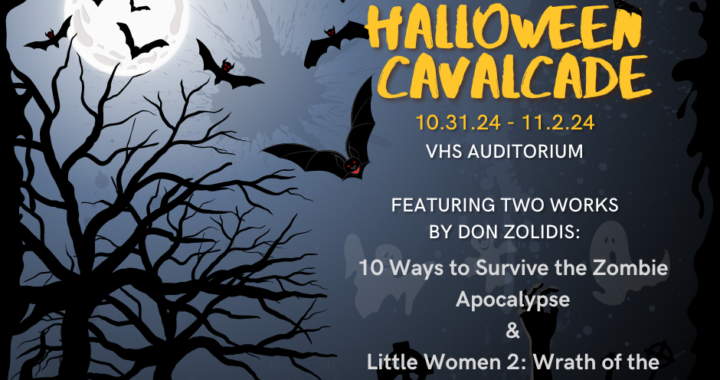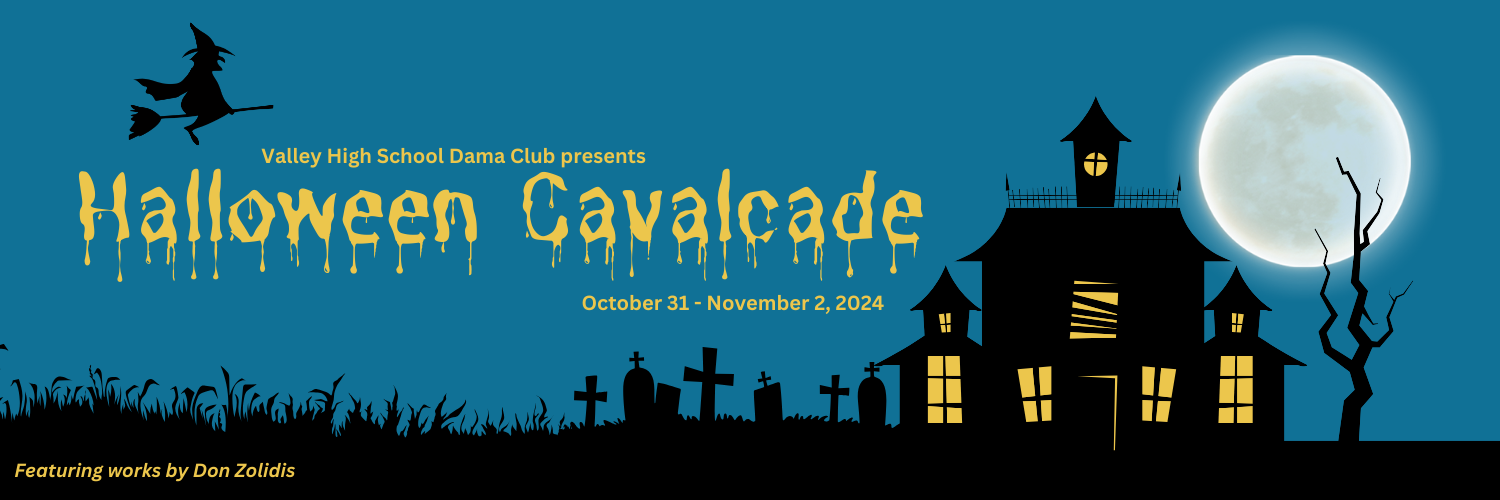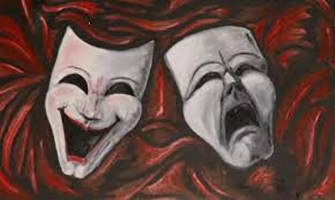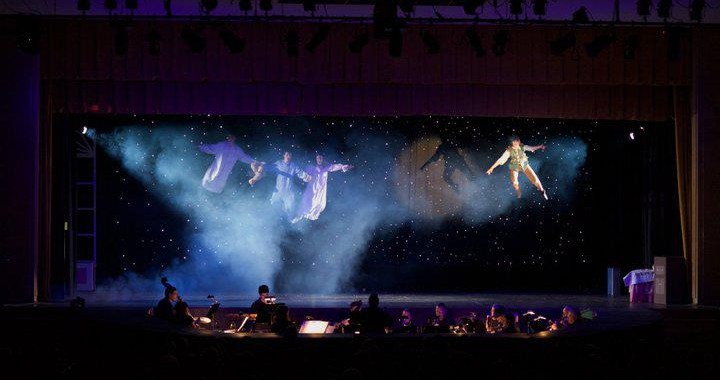Congratulations to the cast of our upcoming holiday production (nearly) ‘10 Ways to Survive the Holidays,‘ listed below! We will begin rehearsals soon for our show, to be held on December 15, 2024! Watch the VHS Drama Club’s Facebook page for more information about rehearsals and our first-ever Holiday Market & Children’s Day!
Author Archives: bkrugleVHS
Unleash your inner star! VHS Drama Club’s Audition Workshop!
- Being prepared — know what the show you are auditioning for is all about … knowing the characters in the show … understanding what the production staff might expect from you.
- Being confident — having faith in yourself … know your strengths and play to them … know there’s no one else like you … understanding proper body language and posture
- Being flexible — expect the unexpected … don’t think you know how it’s going to go … be ready to change what you are doing when the staff asks you … playing more than just one emotion … take risks
- Dressing appropriately — knowing that what you wear can impact not only your attitude, but the staff’s impression of you … understanding what you will be doing during auditions is moving around, so dress like you know that
- Using your waiting time — knowing how to not just sit there and scroll your phone while others are auditioning … studying the other auditioners …
- Controlling your nerves — understanding that everyone is nervous … helping you make your nerves work to your advantage … remembering to breathe
- Having fun — realizing this is not life or death — it’s just a show and the whole reason you are here is to enjoy yourself with your friends
In conclusion, by attending our workshop, you’ll gain valuable insights and practical strategies to navigate auditions with confidence and ease. Discover the secrets to being prepared, confident, flexible, and memorable. Whether you’re a seasoned actor or just starting out, this workshop will empower you to land more roles and enjoy the audition process. Don’t wait any longer! Sign up today and take your acting career to new heights.
Announcing the cast of our Halloween Cavalcade!
Announcing Auditions for the VHS Drama Club’s Halloween Cavalcade!
Valley High School Drama Club Presents: Halloween Cavalcade
Get ready to be spooked and thrilled! The Valley High School Drama Club is seeking talented actors to bring to life two chillingly fun one-act plays written by Don Zolidis.
Auditions will be held on Thursday, September 5th at 6:30 PM in the VHS auditorium.
We’re looking for actors to join us in our production of:
- 10 Ways to Survive the Zombie Apocalypse: In this hilarious and heart-pounding tale, a group of mismatched survivors must band together to outsmart and outrun the undead horde. Can they find a way to escape the zombie apocalypse, or will they fall victim to the living dead?
- Little Women 2: Wrath of the Undead: In this terrifying twist on a classic tale, the March sisters find themselves in a battle for survival against a zombie outbreak. Will their courage and sisterhood be enough to overcome the undead threat?
No experience is necessary, just a love for acting and a willingness to have fun!
Questions? Contact us at [email protected] or visit our Facebook page for more information!
Support arts in our schools!
The VHS Drama Club is one of the main drivers of extra-curricular arts-related activities for students on the New Kensington-Arnold School District. Since our relaunch in the late 1990’s, we have been able to give over 1,000 students and scores of Alle-Kiski Valley community members an experience that they will receive nowhere else.
Every year, mounting successful fall and spring productions costs in excess of $30,000. From costumes to make-up, props to sets, marketing and special effects, live theatre is one of the most magical experiences to become involved in, with something for everyone. However, bringing this experience to our students, friends and families has become more and more difficult.
We are appealing to you, the community of supporters who has been with us every step of the way. If you have attended one of our productions, helped to transform our stage or placed a costume on our backs and enjoyed your experience, please consider donating to our organization. Any amount from $1 to $1,000 will go a long way in ensuring that the magic of theatre continues to thrive in our schools.
All donations will be recognized during our production of Peter Pan this spring. You may also keep your donation anonymous, should you wish. Thank you for your continued support of our organization and arts in our schools.
Take A Bow: 10 Ways Being A Theatre Kid Made You A Successful Adult
Reprinted from elitedaily.com, written by De Elizabeth. Original article here.
As a former theatre kid, you probably got an awful lot of sh*t. It’s likely that you were reputed to be loud, over-dramatic and known to do “odd” things, like burst into song at any given moment.
However, as you and all theatre kids know, many of your valuable life lessons have derived from days spent in rehearsals or at performances.
You can credit a wide range of skills used in your daily adult life to what you learned as a teenager, when you were known as the “weird theatre kid.”
As a young adult, you can look back on your days in high school drama club with both nostalgia and gratitude.
Not only were those long evening rehearsals an absolute blast because you were with your friends, laughing at inside jokes and having sing-alongs to the “Wicked” original recording, but because being part of a production helped you grow immensely.
So, let’s take a moment to pause in our busy adult lives to remember what it felt like to be 16 and putting on our first pair of character shoes.
Here are 10 ways theatre class creates some pretty awesome adults:
1. You learned the harsh taste of rejection early… and how to cope.
Every theatre kid knows that one-two punch of waiting… and waiting… and waiting for the cast list, only to be met with sheer disappointment.
It feels like being pushed off a cliff; your heart races as you scan the names, wondering why you don’t see your own. You look twice, and even a third time and then, it finally settles in. You didn’t make it.
The first time this happened to you, it was devastating. You wondered what you did wrong; you felt worthless. You may have cried for an hour or more.
You kept auditioning though, and you kept trying. Truth be told, rejection sucked every time, but it somehow got easier. You learned that it wasn’t personal, that maybe you just weren’t the right fit.
You learned to ask your director questions instead of bottling up your feelings. You focused on what you could do better next time.
This way of thinking stuck with you as you grew up. Sometimes, it’s just not the right role, job or boyfriend, but it doesn’t mean you suck as a person. You’ve developed a thicker skin and you’re tougher than many of your peers.
2. You know that success doesn’t come without hard work.
Any time you landed a juicy role in a show, you had to work your butt off for it. You never rolled into an audition without adequate preparation; you made sure you knew your song or monologue cold.
Additionally, you know how much time goes into creating a successful production. It takes hours of rehearsals and dress rehearsals, countless weekend set builds, tech days to program the lighting, costume fittings, and the list goes on and on.
You didn’t get to collect your bouquet of flowers until you contributed the necessary blood, sweat and tears.
This philosophy doesn’t end with the theatre — it extends into all areas of your life. Accomplishments do not exist without great effort.
3. “Getting into character” taught you empathy.
If there’s any person who understands the meaning behind the phrase “put yourself in her shoes,” it’s you. This is literally what you had to do every time you approach a new role.
Your acting exercises include instructions to connect moments in your own life to that of your character. You had to look for similar emotions within your own heart.
This wasn’t always easy, especially if you were playing a character unlike whom you actually are. Sometimes you felt disconnected from a role, and you had to look inward in order to grasp it.
This skill has been essential to you; it’s helped you understand the world around you. You can relate to others, and you’re able to interpret their behaviors, even if you don’t agree with them.
4. Spontaneity is in your blood.
Before “YOLO” was a thing, there was the Broadway show “Rent,” which taught all former theatre kids this important lesson: “No day but today.”
To say you embraced this to the fullest is an understatement. You’re fun to be around because you adore spontaneity. You’re the type of person who will shout “road trip!” and you get excited about making adventure of everyday activities.
You have an appreciation for living in the moment because you know how much each moment counts. A moment can make or break your audition, and a moment can make an audience member laugh or cry.
You strive to make the most out of every second of every day, and you look for ways to create excitement.
5. You are a kickass problem-solver.
In live theatre, things are bound to go wrong at some point. Maybe you had to step in and take the place of a fellow actress who was sick, or perhaps, you lost a prop mid-show and had to figure out how to deal.
If you worked backstage, your problem-solving skills might even be sharper. You had to prepare to help yourself and the actors if need be.
When something goes wrong during a performance, there is zero time for panic. All you can do is launch into damage-control mode and focus on the solution at hand.
You know how to keep your cool during a crisis, and you know that the goal is to solve the problem. The best thing you can do is work toward that goal, without melting down.
6. Thinking on your feet is your specialty.
You’re probably cringing as you remember a time when your scene partner forgot all of his lines and you had to improvise your way through it.
You were sweating underneath your costume and trying to summon every ounce of possible psychic willpower to telepathically send him his lines. When you exited the stage, your friends surrounded you and praised your improvisational skills.
Or perhaps, your scene partner forgot an entrance, leaving you alone onstage with an entire audience staring at you.
Sometimes, things go wrong and there’s absolutely no time to plan a solution. When that happens, you have to have cat-like reflexes and be fast on your toes.
Luckily, you learned this (perhaps the hard way) during those terrifying theatrical moments and you now have the strengths to handle unexpected obstacles.
7. You’re well-spoken.
“The lips, the teeth, the tip-of-the-tongue!”
All of those drills you did as vocal warm-ups probably haven’t left your brain, even after a decade.
You know how to project your voice, how to use correct diction and enunciation, and how to craft the sound of your voice in order to be understood.
Thanks to all the speech exercises — not to mention that time you did Shakespeare —, you are quite skilled at speaking eloquently.
This comes in handy when you go on job interviews or when you have to give presentations at work. You’ll find yourself channeling those tools from class, and you’ll feel grateful when you’re respected by those you’re speaking to.
8. You’re a go-getter.
In theatre, you don’t get what you want without putting yourself out there first. In order to be cast in a show, you have to audition. In order to be on the production team, you have to interview. End of story.
Building confidence is key; you had to give yourself many pep talks before you ventured out to your first audition and to many auditions after that.
It takes a lot of effort and self-esteem to push apprehension aside and go for it anyway.
You know that life demands similar qualities out of you and that no reward comes without some element of risk.
9. Fear doesn’t get the best of you.
You remember your first few auditions in high school and the feeling of getting onstage in front of your teachers (and sometimes peers). Your palms were probably sweaty, and maybe, your knees shook a little.
It’s possible this happened every time you auditioned; many professional performers confirm that stage fright never entirely disappears.
Despite the fact that you were scared, you learned how to control your nerves. You learned how to seize that nervous energy and trap the butterflies that ran rampant in your stomach.
That sense of control allowed you to channel that energy into whatever you wanted it to be, and you put it toward a successful performance.
As you navigate your 20s, you know that you’ll find yourself in many situations that create anxiety and nerves. However, you won’t run from those scenarios; instead, you’ll face them head on with deep breaths and confidence.
10. Your friendships run deep
Perhaps most importantly, being in theatre gave you several dozen families over the years. Every show became its own chapter in this larger story of your theatrical endeavors.
With each cast, you bonded in a different way, some more closely than others.
You’ve been lucky to have shared the stage with some of these people and even luckier to have them in your life now.
You care a lot about your friends, and the bonds that you’ve created will forever remain unbroken, even after your final curtain call.
Go into the arts…
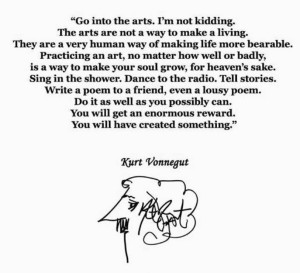
Go into the arts
Did you know? Benefits of drama in education

Drama in Education: Proven beneficial to everyone
DRAMA IN EDUCATION: DID YOU KNOW …
- Students involved in drama performance coursework or experience outscored non-arts students on the 2005 SAT by an average of 65 points in the verbal component and 34 points in the math component?
- Drama activities improve reading comprehension, and both verbal and non-verbal communication skills?
- Drama helps to improve school attendance and reduce high school dropout rates?
- A 2005 Harris Poll revealed that 93% of the public believes that arts, including theatre, are vital to a well-rounded education?
- Drama can improve skills and academic performance in children and youth with learning disabilities?
DRAMA IMPROVES ACADEMIC PERFORMANCE
Numerous studies have demonstrated a correlation between drama involvement and academic achievement. In addition to having higher standardized test scores than their peers who do not experience the arts, student who participate in drama often experience improved reading comprehension, maintain better attendance records, and stay generally more engaged in school than their non-arts counterparts. Schools with arts-integrated programs, even in low-income areas, report high academic achievement.
DRAMA STUDENTS OUTPERFORM NON-ARTS PEERS ON SAT TESTS
The College Entrance Examination Board reported student scores from 2001, 2002, 2004, and 2005 using data from the Student Description Questionnaire indicating student involvement in various activities, including the arts. As compared to their peers with no arts coursework or involvement:
- Students involved in drama performance scored an average of 65.5 points higher on the verbal component and 35.5 points higher in the math component of the SAT
- Students who took courses in drama study or appreciation scored, on average, 55 points higher on verbal and 26 points higher on math than their non-arts classmates.
- In 2005, students involved in drama performance outscored the national average SAT score by 35 points on the verbal portion and 24 points on the math section.
ATTENDANCE
Research indicates that involvement in the arts increases student engagement and encourages consistent attendance, and that drop-out rates correlate with student levels of involvement in the arts.
- Students considered to be at high risk for dropping out of high school cite drama and other arts classes as their motivations for staying in school.
- Students who participate in the arts are 3 times more likely to win an award for school attendance than those who do not.
READING COMPREHENSION
From learning to read to the in-depth study of Shakespearean literature, drama can play a significant role in the continual development of students’ reading comprehension skills. Studies indicate that not only do the performance of a story and a number of other drama activities in the classroom contribute to a student’s understanding of the work performed, but these experiences also help them to develop a better understanding of other works and of language and expression in general. The results below were gleaned from studies where educators and students alike noticed a difference when drama played a part in their classrooms,
- A series of studies on the arts and education revealed a consistent causal link between performing texts in the classroom and the improvement of a variety of verbal skills, including especially significant increases in story recall and understanding of written material.
- Performance of Shakespeare texts helps to improve students’ understanding of other complex texts including science and math material.
- Drama can improve reading skills and comprehension better than other activities, including discussion.
BUILDING SELF-ESTEEM THROUGH DRAMA
In addition to building social and communication skills overall, involvement in drama courses and performance has been shown to improve students’ self-esteem as well as their confidence in their academic abilities.
- High school students who are highly involved in drama demonstrate an elevated self-concept over those who are not involved .
- Playwriting original works and dramatic presentation of existing works can help to build the self-esteem and communication skills of high school students.
- The act of performing can help students and youth recognize their potential for success and improve their confidence .
BRIDGING THE ACHIEVEMENT GAP
Since the implementation of the No Child Left Behind Act, there has been a national focus on closing the “achievement gap” between students of varying abilities, socioeconomic status, and geographies among other factors that may directly or indirectly affect a student’s academic success. The arts, including drama, address this issue by catering to different styles of learning, and engaging students who might not otherwise take significant interest in academics. Additionally, research indicates that drama courses and performance have a particularly positive effect on at-risk youth and students with learning disabilities.
- A study published in Champions of Change (1999) cites theatre arts, including performance, classes, and participation in a drama club, as a source for “gains in reading proficiency, gains in self-concept and motivation, and higher levels of empathy and tolerance towards others” among youth of low socio-economic status .
- Drama activities can improve and help to maintain social and language skills of students with learning disabilities and remedial readers .
- Improvisational drama contributes to improved reading achievement and attitude in disadvantaged students .
PUBLIC OPINION ON THE IMPORTANCE OF DRAMA
What does the average American think of drama? The statistics from the studies below show that most of the public feels the performing arts play a significant role in our culture and communities and are important to America’s youth.
In 2002, the Performing Arts Research Coalition (PARC) conducted surveys in 10 major metropolitan areas regarding the role of Performing Arts in their lives and communities . They discovered that at least 90 percent of respondents from each metropolitan area agreed or strongly agreed that the performing arts contribute to the education and development of children.More than 60 percent of respondents in each location who had children aged 13 and older strongly agreed that the performing arts contribute to the education and development of children.On average, just over half of respondents had attended a live theatre performance in the past year. According the to surveys in all 10 cities, live theatre is the most commonly attended type of performance. According to a May 2005 Harris Poll :
- 93 percent of Americans believe that the arts are essential to a complete education
- 79 percent feel that the arts should be a priority in education reform
- 79 percent consider the issues facing arts education to be significant enough to merit their personally taking action.


